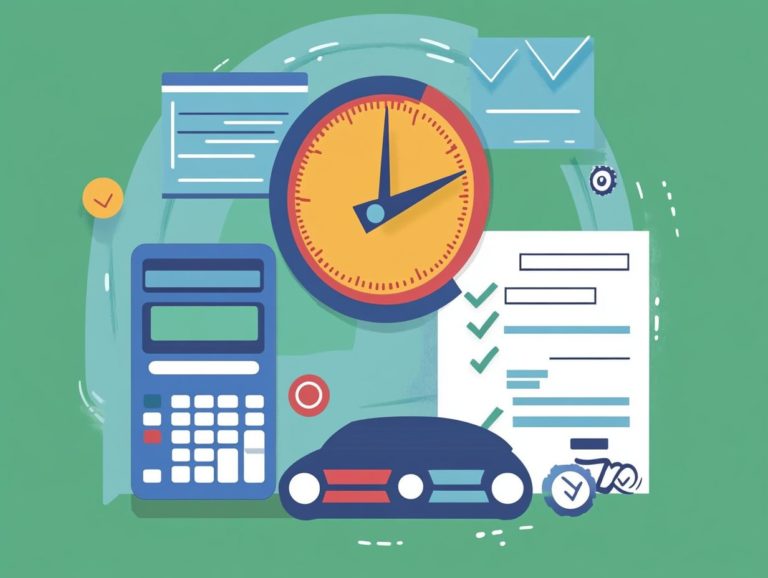5 Essential Documents Needed for Car Financing
Navigating the world of car financing can feel like a daunting task, particularly when it comes to gathering all the necessary paperwork. Get ready to master your car financing journey!
Whether you re a first-time buyer or considering an upgrade to your vehicle, understanding the essential documents needed for financing is crucial. This article delves into the five key documents you should have on hand, along with the various car financing options available to you, presenting their pros and cons.
You ll also find valuable tips to boost your chances of approval and highlight common pitfalls to avoid. Additionally, we will guide you on accurately calculating your total financing costs.
Contents
- Key Takeaways:
- 1. Proof of Income
- 2. Identification and Personal Information
- 3. Proof of Residence
- 4. Vehicle Information and Registration
- 5. Insurance Information
- What Are the Different Types of Car Financing Options?
- What Are the Pros and Cons of Each Type of Car Financing?
- How Can One Improve Their Chances of Getting Approved for Car Financing?
- What Are the Common Mistakes to Avoid When Applying for Car Financing?
- How Can One Calculate the Total Cost of Car Financing?
- What Are the Possible Consequences of Defaulting on Car Financing?
- Frequently Asked Questions
- What Are the 5 Essential Documents Needed for Car Financing?
- Why Do I Need a Valid Driver’s License for Car Financing?
- What Is Considered Proof of Income for Car Financing?
- Can I Use My Current Address as Proof of Residence for Car Financing?
- Do I Need to Have Car Insurance Before Applying for Car Financing?
- What Information Do I Need to Provide in a Credit Application for Car Financing?
Key Takeaways:

- Proof of income is a crucial document needed for car financing, as it shows the lender your ability to make payments.
- Identification and personal information are necessary for the lender to verify your identity and assess how likely you are to repay a loan.
- Proof of residence is needed to confirm your current address and to ensure that you are a reliable borrower.
1. Proof of Income
Proof of income is essential for your car loan application. It validates your financial ability to handle monthly payments.
Lenders typically seek various forms of proof to assess the stability of your income, such as pay stubs, tax returns, and employment letters. These documents collectively provide insight into your job security.
For example, consistent pay stubs showcase your regular income, while tax returns offer a snapshot of your annual financial health. Employment letters confirm your position and salary, further strengthening your application.
A strong credit score can enhance your income verification efforts, reflecting responsible borrowing habits and timely repayments. This makes you a more appealing candidate to lenders, potentially leading to better loan terms.
2. Identification and Personal Information
When applying for a car loan, providing precise identification and personal information is essential. This information allows lenders to evaluate your creditworthiness, including your credit report and any existing obligations tied to your Social Security number or driver’s license.
Along with these documents, you may also need to present proof of residency and income, which will further bolster your application.
This thorough documentation process minimizes discrepancies that could lead to costly delays or even denial of your loan. By ensuring the accuracy of your personal details, you can steer clear of potential pitfalls.
Maintaining a clean credit report is highly beneficial, as it often translates to more favorable loan terms, such as lower interest rates and less stringent approval criteria. This can significantly enhance your overall borrowing experience.
3. Proof of Residence
Proof of residence is a vital requirement when securing an auto loan. It establishes your current living situation and helps lenders verify your personal details.
Typically, you’ll need documents like a utility bill, mortgage statement, or lease agreement. These documents serve as tangible evidence of your address and stability.
Lenders value this information because it helps them assess the likelihood of timely repayments, mitigating risks associated with lending. A stable residence often signals reliability, swaying the approval process in your favor.
Depending on the verification you present whether a government-issued ID with your address or recent bank statements your chances of securing favorable loan terms can markedly improve. Therefore, it s essential to provide the most credible and up-to-date evidence possible.
4. Vehicle Information and Registration

Providing accurate vehicle information is crucial when applying for a car loan. Lenders need details like the vehicle identification number (VIN), current registration, and a purchase agreement to evaluate the car’s value and ensure it meets their financing criteria. Referring to the essential checklist for car financing can help you gather all the necessary documents.
The VIN acts as a unique fingerprint for your vehicle, allowing lenders to trace its history think accidents, repairs, or title issues. These factors can significantly impact its market value. The current registration confirms the vehicle’s legal status, ensuring it isn t flagged for any violations or liens that could complicate your loan process.
The purchase agreement outlines the terms of the sale, helping lenders calculate the financing amount based on the price you ve agreed upon. Any inaccuracies in your vehicle registration can create discrepancies that delay approval or even jeopardize the loan altogether. This underscores the importance of careful paperwork throughout the process.
5. Insurance Information
Insurance information plays a pivotal role in your car financing journey. Lenders typically require proof of insurance to ensure your vehicle is adequately covered. You often need to secure an insurance binder from a reputable company before finalizing the auto loan agreement. An insurance binder, which is a temporary proof of insurance, helps you complete the financing process smoothly.
This requirement arises from the lender s intent to safeguard their investment, especially considering the vehicle’s value and the risks of accidents or theft. Different lenders may have varying insurance requirements, which could include comprehensive, collision, liability, and uninsured motorist coverage.
Understanding your coverage is essential! Having sufficient insurance not only meets the lender’s criteria but also protects you from significant financial loss in unforeseen events. Neglecting to secure adequate insurance can leave you vulnerable to considerable risks, including out-of-pocket expenses for damages or liabilities that might exceed your policy limits.
What Are the Different Types of Car Financing Options?
Exploring various car financing options is crucial for making informed financial decisions. Each choice whether it s a traditional auto loan or a lease agreement comes with its own set of lender options, interest rates, and loan terms that can significantly affect your overall costs and payment structure.
When considering direct loans, you might find competitive interest rates that depend largely on your credit score and financial health. This route provides greater flexibility in vehicle ownership, but be aware that it often leads to higher monthly payments, particularly if you choose a longer loan term.
Leasing can be quite tempting due to lower monthly payments and the chance to drive a new car every few years. However, keep in mind the mileage limitations and the fact that you won’t gain any ownership equity.
Dealer financing may also catch your eye, especially with promotional rates on the table. Just remember to scrutinize the terms carefully. Ultimately, assessing your financial situation including your budget and long-term goals is essential to determining the best path forward.
What Are the Pros and Cons of Each Type of Car Financing?
Evaluating the pros and cons of various car financing options enables you to navigate your choices with confidence. By balancing factors such as loan terms, interest rates, and lender options, you can uncover the financial arrangement that best suits your needs.
These elements not only affect your monthly payments but also significantly influence the overall cost of financing. The cost can fluctuate dramatically based on the interest rate you secure. For instance, a low-interest loan can make purchasing a new car much more appealing, allowing you to save on the total interest paid over time.
On the flip side, leasing a vehicle offers flexibility with shorter-term commitments and access to the latest models. However, it may come with mileage restrictions and a lack of long-term ownership benefits. If you’re in the market for a family car intended for years of use, traditional financing might be the way to go. However, if you’re after a luxury vehicle for just a couple of years, leasing could prove to be more advantageous.
How Can One Improve Their Chances of Getting Approved for Car Financing?

Enhancing your chances of securing car financing requires a proactive strategy. Begin by maintaining a solid credit score, gathering all the necessary documentation, and seeking loan preapproval from multiple lenders. This approach will bolster your negotiating power.
Start by analyzing your current credit report and addressing any discrepancies you may find. Prioritize reducing outstanding debt; this demonstrates responsible financial management and can lead to an improved credit score. Consistently making on-time payments is crucial, as it builds your reliability in the eyes of lenders.
Having a comprehensive documentation checklist streamlines the application process. Securing loan preapproval can dramatically simplify your financing journey, allowing you to focus on selecting the vehicle of your dreams while utilizing essential tips for car financing negotiations to avoid lingering uncertainty about potential financing hurdles.
What Are the Common Mistakes to Avoid When Applying for Car Financing?
Avoiding mistakes in the car financing application process is key to success. Errors like incomplete documentation or misunderstandings of your credit report can hurt your chances of approval.
Many applicants underestimate how important it is to review their credit report before submitting their application. This mistake can result in higher interest rates or even rejections due to inaccuracies.
Neglecting to create a documentation checklist can lead to missing critical paperwork. This could delay your application and raise concerns for lenders.
To avoid these issues, get your credit report early. Create a checklist of required documents like income verification, identification, and proof of residence to streamline your application process.
How Can One Calculate the Total Cost of Car Financing?
Calculating the total cost of car financing is crucial for you as a prospective buyer. It involves assessing several factors such as your monthly payment, down payment, interest rates, and the overall loan amount. This will help you make informed financial decisions.
Understanding the formulas behind these calculations enables you to navigate financing options more effectively. The total cost encompasses not just the principal loan balance but also the interest accrued over the loan term. This is significantly influenced by your initial down payment. A larger down payment typically reduces the loan amount, leading to lower monthly payments and less overall interest paid.
Consider this: on a $30,000 car loan with a 5% interest rate over five years, a $5,000 down payment will lower your monthly payments compared to a mere $1,000 down payment. This example illustrates how down payments can profoundly impact loan terms, enabling you to save money and make your financing more affordable.
Take control of your car financing journey today!
What Are the Possible Consequences of Defaulting on Car Financing?
Defaulting on car financing can lead to serious repercussions, including a significant dip in your credit score, the repossession of your vehicle, and potential legal troubles. These consequences can make your finances a real mess!
Such setbacks can create hurdles when you re trying to obtain financing for essential purchases, like a home or a personal loan later on. Your lender may begin collection efforts soon after, which could escalate into legal actions, adding further strain to your finances.
To avoid this situation, keep communication open with your lenders. They often have programs that can offer temporary relief. You might also want to explore other repayment options, such as restructuring your loan or opting for deferment, to ease the pressure during challenging financial times.
Frequently Asked Questions

What Are the 5 Essential Documents Needed for Car Financing?
The 5 essential documents needed for car financing are:
- A valid driver’s license
- Proof of income
- Proof of residence
- Proof of insurance
- A completed credit application
Why Do I Need a Valid Driver’s License for Car Financing?
A valid driver’s license is required for car financing because it proves that you are legally allowed to drive and operate a vehicle. Before making a decision, consider asking 5 questions about car financing options, as lenders want to ensure that you have a valid license to minimize the risk of accidents or legal issues.
What Is Considered Proof of Income for Car Financing?
Proof of income for car financing can include pay stubs, bank statements, tax returns, or a letter from your employer. If you’re unsure about what to prepare, check out this guide on how to prepare for a car financing application. Lenders need to see your income to assess your ability to make monthly car payments.
Can I Use My Current Address as Proof of Residence for Car Financing?
Yes, you can use your current address as proof of residence for car financing. Lenders want to confirm that you have a stable place of residence and are more likely to approve your loan if you can provide a current address.
Do I Need to Have Car Insurance Before Applying for Car Financing?
Yes, you need to have car insurance before applying for car financing. Lenders require proof of insurance to protect their investment in case of any accidents or damages to the vehicle.
What Information Do I Need to Provide in a Credit Application for Car Financing?
A credit application for car financing typically requires personal information such as your name, address, Social Security number, employment history, and income. Additionally, it’s important to gather the essential documents needed for new car purchase, including details about the vehicle you intend to buy.
Don t wait! Reach out today to explore your options with your lenders.






